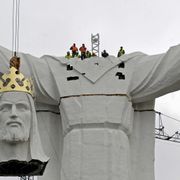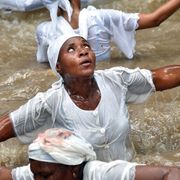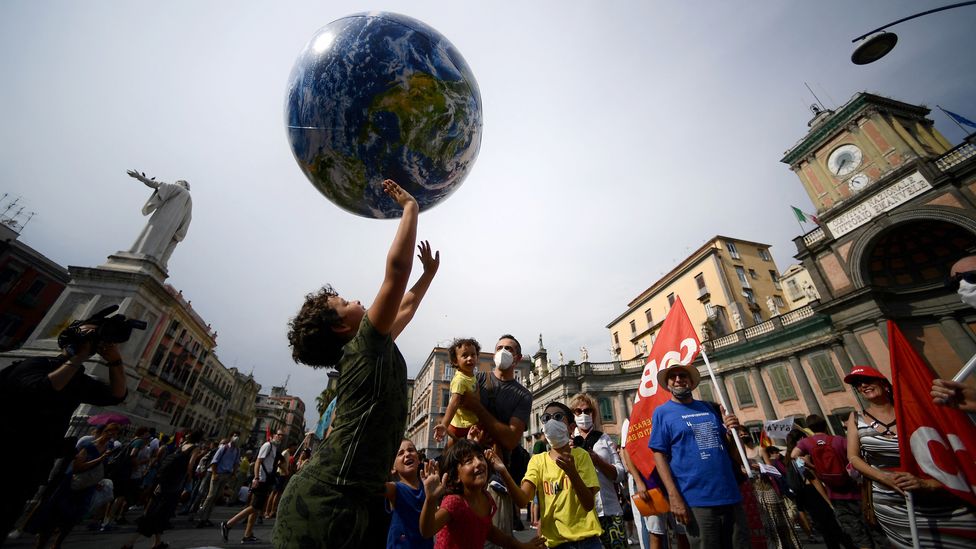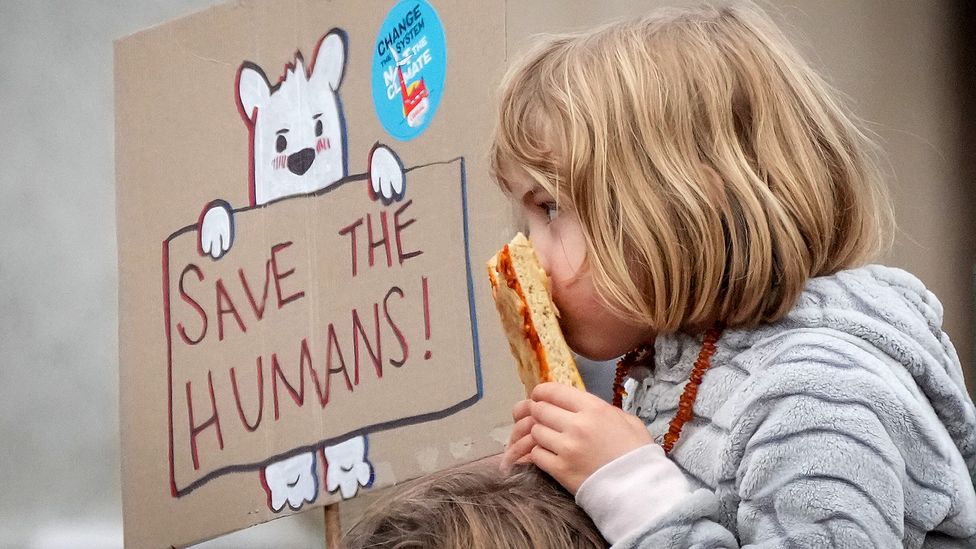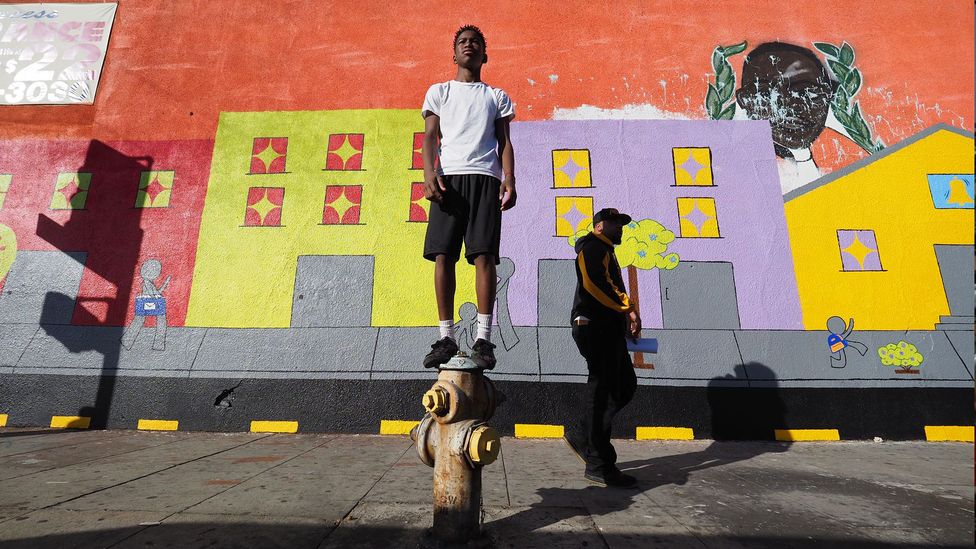Which came first -
human consciousness or eusociality?
Or, put another way, which created which?
Introduction
Here's an interesting take on humanity's evolutionary roots combining the evolutionary concepts of natural selection with group selection. From an Evolutionary Creationist standpoint, a Christian can look at this evolutionary process as yet another evidence of God's amazingly intricate involvement with the development of the homo sapien line of hominids. By coaxing forth a trait, gene, or tendency, towards sustaining/promoting "the group over the individual' the homo sapien line became the predominant species to survive and build itself into like-civilizations dedicated to protecting its community against all other forces. Apparently, man is not only social but "eu-social," behaving beyond mere self-interest to the promotion of a bonded group dedicated to one-another's survival through altruism, sacrifice of self-interests, division of labor, and become super-cooperators.
A Biblical Idea that is Evolutionary
Running with this idea a bit further in a theological direction (since as a Christian I must view humanity's origins from a Godward viewpoint, rather than as an atheistic/agnostic viewpoint) I might suggest some additional theologic observations.... In Scripture we read that God cautions time and again to sacrifice oneself for the promotion of one's neighbor (love one another); or, God directed His people towards assemblage and community as federated tribes such as is seen in the Jewish tribes of Israel; or that eusociality is seen in Jesus' works of social justice and benevolence towards others unlike himself; or even in God's sacrifice of Himself through crucifixion for the ultimate survivability of mankind's eternal future (in biblical terms); or in the resultant church's communal worship, witness and ministry evidenced over the past 2000 years; and finally, resulting in a future everlasting Kingdom made up of a society of converts super-cooperating with one another by providing humanitarian services described in terms of peace, harmony, good will; moreover, this Kingdom community further projects itself through a mutually determined co-existence with nature by nurturing the earth in a massive ecological reconstruction requiring the maintenance and preservation of all biological, geological, and cosmic subsystems. A final observation might be added in observing the Bible's usage of the significant Greek terms of koinonia (= "community, communion, joint participation, sharing and intimacy") and allylon (= "one another") found throughout New Testament passages. Hence, the church celebrates Jesus' resurrection through the eucharist in a koinonia memorial of remembrance. Likewise, Christians are to devote themselves to one another in a whole host of services that focuses on practices and attitudes that would preserve unity, harmony, peace, love and forgiveness within the walls of the church made up of converts emerging from dissimilar environments to one another.
An Evolutionary Idea that is Biblical
Of course the downside to all this is that in order to get from "there to here" on an evolutionary scale the hominid line would fight and struggle for its survival over that of other lesser-enabled hominids (including its earlier apelike ancestors). However, sin being sin, one could mundanely state that "individual (natural) selection" was what was required in order to survive against a primordial world evolving apart from a later developing ethical and moral consciousness that would arise within both the animal kingdoms and hominid lines. So that a corresponding type, or kind of, prehistoric "self-consciousness" was also evolving within this very same prehistoric time of burly, bloody, self-interest, self-promotion, and survival. A consciousness that most probably had a very low-level (if at all) awareness of the ethical/moral possibilities occurring within this newly-arisen and social hominid being found in its earliest developmental stages.... And if one accounts for free will both within the animal/hominid line, as well as within creation itself (more popular known by the older term, natural law(s)), especially a free will that tended towards death and destruction (the Christian term for this is sin), than it gives us an even more amazing picture of the intricate involvement of a Creator-God in directing a disorderly cosmos (and animal kingdom) towards order and restoration through a formative consciousness and ethical responsibility. Even an order that would someday create a self-consciousness that could contemplate the ethereal, metaphysical concepts of morality and ethics - especially in social and existential terms! - relative to oneself, one's society, and even of a Deity as Sovereign/Creator. Amazing indeed when considering prehistoric man has arisen from the primordial soup of star dust to someday realize his very place amongst the stars themselves with the Lord of creation. Mankind's eternal North Star and heavenly compass sovereignly directing away from sin's death-and-destruction to life-everlasting by the very work of this Creator-God through His Son Jesus. Called in the Bible as man's bright Morning Star of redemptive rebirth and divine re-creation.
Conclusion
This apparently is what sets humanity apart from the animal world... that we have evolved - at the hand of God - into sentient beings. And even more than this... into sentient beings who can work together, live together, and host one another's interests over our own. Giving hope that even now, amidst today's societies where brutality and selfishness still exist, that we as a species are rapidly evolving in our eusociality capabilities (sic, through recognition, accommodation, and adaptability) into a super-sentient species wishing to massively cooperate with one another (as evidenced by technology's rapid promotion and ingestion of social networking and inter-cooperative social paradigms) from freedom campaigns and revolutions in despotic worlds of injustice, to the provisioning of social justice and equality to the needy, destitute, poor and socially outcast. All this despite our darker natures of individual self-interest. It gives one pause to wonder aloud the possibilities of our species at the hands of God (even now!) should we not destroy ourselves in the process.... a possibility that can give rise to greater and greater integration of mutually assured, and mutually promoting, complex organization within humanity's increasingly inter-dependent societies. It is the Christian hope. Even as it is a biblical truth that sin, death and destruction will remain against this hope until Christ comes again to put all right (both ecological and sociologically). But in order to put all things spiritually right, a repentance and rebirth must first occur, as provided through Jesus' atonement. And through this redemption will come the infinite possibilities for re-creation and re-newal down into the very depths of our personal beings and social orders. Verily, even into our sinful hearts and minds. A rebirth that would at once remove the internal disorders of sin within the human breast of lusts and temptations, and rebirth an abandoned divine order lost eons ago at the dawn of creation. An ancient primordial creative order that the ancient Jews would call "Shalom" - and we would acknowledge as "life and blessing" - wherein the image of our Creator God is birthed, mirrored, realized and brought into cosmic re-alignment and daily experience. Even so may God's shalom be our peace this very day through His Son Jesus Christ. And may that shalom become our evolving spiritual reality day-to-day personally, socially, ecologically, and with the very God of Creation Himself. The Redeemer and Lover of our souls.
R.E. Slater
April 16, 2012
 |
| Wilson says our instinct to settle down both ensures our success and dooms us to conflict. |
Biologist E.O. Wilson on
by E.O. Wilson
Apr 2, 2012
Religion. Sports. War. Biologist E.O. Wilson says our drive to join a group—and to fight for it—is what makes us human.
Have you ever wondered why, in the ongoing
presidential campaign, we so strongly hear the pipes calling us to arms? Why the religious among us bristle at any challenge to the creation story they believe? Or even why team sports evoke such intense loyalty, joy, and despair?
The answer is that everyone, no exception, must have a tribe, an alliance with which to jockey for power and territory, to demonize the enemy, to organize rallies and raise flags.
And so it has ever been. In ancient history and prehistory, tribes gave visceral comfort and pride from familiar fellowship, and a way to defend the group enthusiastically against rival groups. It gave people a name in addition to their own and social meaning in a chaotic world. It made the environment less disorienting and dangerous. Human nature has not changed. Modern groups are psychologically equivalent to the tribes of ancient history. As such, these groups are directly descended from the bands of primitive humans and prehumans.
The drive to join is deeply ingrained, a result of a complicated evolution that has led our species to a condition that biologists call eusociality. “Eu-,” of course, is a prefix meaning pleasant or good: euphony is something that sounds wonderful; eugenics is the attempt to improve the gene pool. And the eusocial group contains multiple generations whose members perform altruistic acts, sometimes against their own personal interests, to benefit their group.
Eusociality is an outgrowth of a new way of understanding evolution, which blends traditionally popular individual selection (based on individuals competing against each other) with group selection (based on competition among groups). Individual selection tends to favor selfish behavior. Group selection favors altruistic behavior and is responsible for the origin of the most advanced level of social behavior, that attained by ants, bees, termites—and humans.
 |
Fierce weaver ants (in Malaysia)
work and fight together |
Among eusocial insects, the impulse to support the group at the expense of the individual is largely instinctual. But to play the game the human way required a complicated mix of closely calibrated altruism, cooperation, competition, domination, reciprocity, defection, and deceit. Humans had to feel empathy for others, to measure the emotions of friend and enemy alike, to judge the intentions of all of them, and to plan a strategy for personal social interactions.
As a result, the human brain became simultaneously highly intelligent and intensely social. It had to build mental scenarios of personal relationships rapidly, both short term and long term. Its memories had to travel far into the past to summon old scenarios and far into the future to imagine the consequences of every relationship. Ruling on the alternative plans of action were the amygdala and other emotion-controlling centers of the brain and autonomic nervous system. Thus was born the human condition, selfish at one time, selfless at another, and the two impulses often conflicted.
Today, the social world of each modern human is not a single tribe but rather a system of interlocking tribes, among which it is often difficult to find a single compass. People savor the company of like-minded friends, and they yearn to be in one of the best—a combat Marine regiment, perhaps, an elite college, the executive committee of a company, a religious sect, a fraternity, a garden club—any collectivity that can be compared favorably with other, competing groups of the same category.
Their thirst for group membership and superiority of their group can be satisfied even with symbolic victory by their warriors in clashes on ritualized battlefields: that is, in sports. Like the cheerful and well-dressed citizens of
Washington, D.C., who came out to witness the First Battle of Bull Run during the Civil War, they anticipate the experience with relish. The fans are lifted by seeing the uniforms, symbols, and battle gear of the team, the championship cups and banners on display, the dancing seminude maidens appropriately called cheerleaders. When the Boston Celtics defeated the
Los Angeles Lakers for the National Basketball Association championship on a June night in 1984, the mantra was “Celts Supreme!” The social psychologist Roger Brown, who witnessed the aftermath, commented, “The fans burst out of the Garden and nearby bars, practically break dancing in the air, stogies lit, arms uplifted, voices screaming. The hood of a car was flattened, about thirty people jubilantly piled aboard, and the driver—a fan—smiled happily ...It did not seem to me that those fans were just sympathizing or empathizing with their team. They personally were flying high. On that night each fan’s self-esteem felt supreme;
a social identity did a lot for many personal identities.”
Experiments conducted over many years by social psychologists have revealed how swiftly and decisively people divide into groups and then discriminate in favor of the one to which they belong. Even when the experimenters created the groups arbitrarily, prejudice quickly established itself. Whether groups played for pennies or were divided by their preference for some abstract painter over another, the participants always ranked the out-group below the in-group. They judged their “opponents” to be less likable, less fair, less trustworthy, less competent. The prejudices asserted themselves even when the subjects were told the in-groups and out-groups had been chosen arbitrarily.
 The tendency to form groups, and then to favor in-group members, has the earmarks of instinct. That may not be intuitive: some could argue that in-group bias is conditioned, not instinctual,
The tendency to form groups, and then to favor in-group members, has the earmarks of instinct. That may not be intuitive: some could argue that in-group bias is conditioned, not instinctual, that we affiliate with family members and play with neighboring children because we’re taught to. But the ease with which we fall into those affiliations points to the likelihood that we are already inclined that way—what psychologists call
“prepared learning,” the inborn propensity to learn something swiftly and decisively. And indeed, cognitive psychologists have found that newborn infants are most sensitive to the first sounds they hear, to their mother’s face, and to the sounds of their native language. Later they look
preferentially at persons who previously spoke their native language within their hearing. Similarly, preschool children tend to select native-language speakers as friends.
The elementary drive to form and take deep pleasure from in-group membership easily translates at a higher level into tribalism. People are prone to ethnocentrism. It is an uncomfortable fact that even when given a guilt-free choice, individuals prefer the company of others of the same race, nation, clan, and religion. They trust them more, relax with them better in business and social events, and prefer them more often than not as marriage partners. They are quicker to anger at evidence that an out-group is behaving unfairly or receiving undeserved rewards. And they grow hostile to any out-group encroaching upon the territory or resources of their in-group.
When in experiments black and white Americans were flashed pictures of the other race, their amygdalas, the brain’s center of fear and anger, were activated so quickly and subtly that the centers of the brain were unaware of the response. The subject, in effect, could not help himself. When, on the other hand, appropriate contexts were added—say, the approaching African-American was a doctor and the white his patient—two other sites of the brain integrated with the higher learning centers, the cingulate cortex and the dorsolateral preferential cortex, lit up, silencing input through the amygdala. Thus different parts of the brain have evolved by group selection to create groupishness, as well as to mediate this hardwired propensity.
When the amygdala rules the action, however, there is little or no guilt in the pleasure experienced from watching violent sporting events and war films in which the story unwinds to a satisfying destruction of the enemy. The horrors make the fascination. War is the strong life; it is life in extremis. Literature and history are strewn with accounts of what happens at the extreme, as in the following from Judges 12: 5–6 in the Old Testament: the Gileadites captured the fords of the Jordan leading to Ephraim, and whenever a survivor of Ephraim said, “Let me go over,” the men of Gilead asked him, “Are you an Ephraimite?” If he replied, “No,” they said, “All right, say ‘Shibboleth.’?” If he said “Sibboleth,” because he could not pronounce the word correctly, they seized him and killed him at the fords of the Jordan. Forty-two thousand Ephraimites were killed at that time. Research has shown that tribal aggressiveness goes well back beyond Neolithic times. And there is a good chance that it could be a much older heritage, dating beyond the split 6 million years ago between the lines leading to modern chimpanzees and to humans, respectively.
The patterns of collective violence in which young chimp males engage are remarkably similar to those of young human males. Aside from constantly vying for status, both for themselves and for their gangs, they tend to avoid open mass confrontations with rival troops, instead relying on surprise attacks. The purpose of raids made by the male gangs on neighboring communities is evidently to kill or drive out its members and acquire new territory. The entirety of such conquest under fully natural conditions has been witnessed by John Mitani and his collaborators in Uganda’s Kibale National Park. The chimp war, conducted over 10 years, was eerily humanlike. Every 10 to 14 days, patrols of up to 20 males penetrated enemy territory, moving quietly in single file, scanning the terrain from ground to the treetops, and halting cautiously at every surrounding noise. If they encountered a force larger than their own, the invaders broke rank and ran back to their own territory. When they encountered a lone male, however, they pummeled and bit him to death. When a female was encountered, they usually let her go. (This latter tolerance was not a display of gallantry. If she carried an infant, they took it from her and killed and ate it.) Finally, after such constant pressure for so long, the invading gangs simply annexed the enemy territory, adding 22 percent to the land owned by their own community.
Our bloody nature, it can now be argued in the context of modern biology, is ingrained because group-versus-group was a principal driving force that made us what we are. In prehistory, group selection lifted the hominids to heights of solidarity, to genius, to enterprise. And to fear. Each tribe knew with justification that if it was not armed and ready, its very existence was imperiled. Throughout history, the escalation of a large part of technology has had combat as its central purpose. Today, public support is best fired up by appeal to the emotions of deadly combat, over which the amygdala is grandmaster. We find ourselves in the battle to stem an oil spill, the fight to tame inflation, the war against cancer. Wherever there is an enemy, animate or inanimate, there must be a victory.
Any excuse for a real war will do, so long as it is seen as necessary to protect the tribe. The remembrance of past horrors has no effect. It should not be thought that war, often accompanied by genocide, is a cultural artifact of a few societies. Nor has it been an aberration of history, a result of the growing pains of our species’ maturation. Wars and genocide have been universal and eternal, respecting no particular time or culture. Overall, big wars have been replaced around the world by small wars of the kind and magnitude more typical of hunter-gatherer and primitively agricultural societies. Civilized societies have tried to eliminate torture, execution, and the murder of civilians, but those fighting little wars do not comply.
Civilization appears to be the ultimate redeeming product of competition between groups. Because of it, we struggle on behalf of good and against evil, and reward generosity, compassion, and altruism while punishing or downplaying selfishness. But if group conflict created the best in us, it also created the deadliest. As humans, this is our greatest, and worst, genetic inheritance.

















